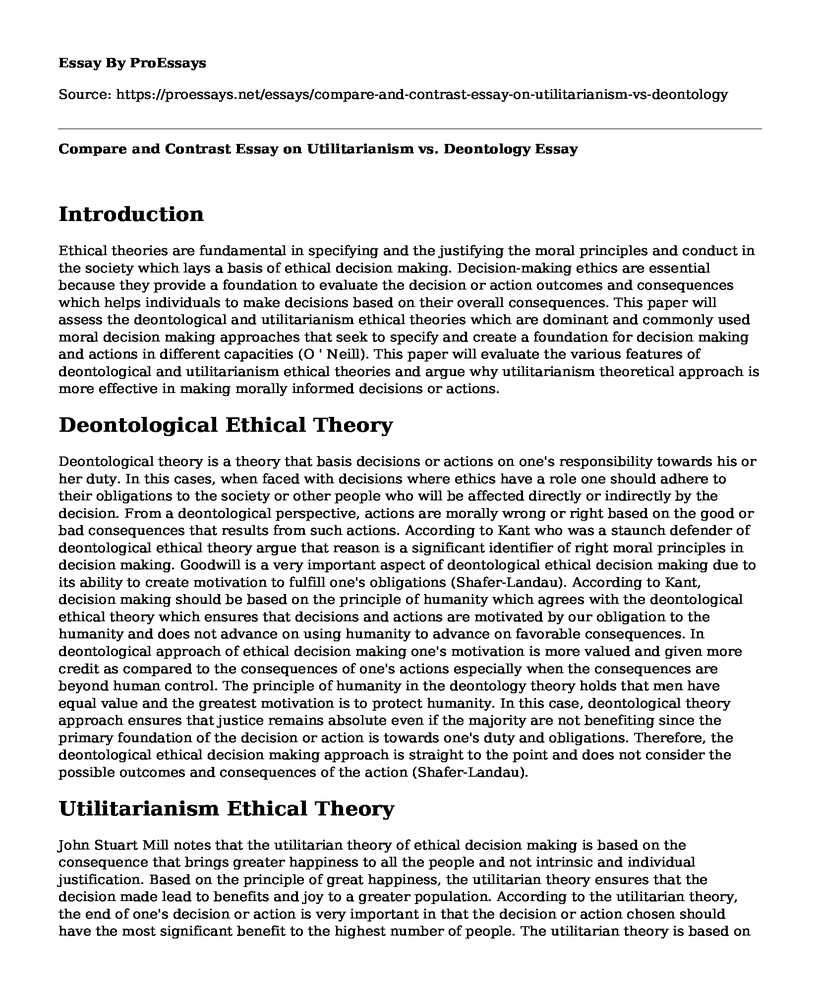Introduction
Ethical theories are fundamental in specifying and the justifying the moral principles and conduct in the society which lays a basis of ethical decision making. Decision-making ethics are essential because they provide a foundation to evaluate the decision or action outcomes and consequences which helps individuals to make decisions based on their overall consequences. This paper will assess the deontological and utilitarianism ethical theories which are dominant and commonly used moral decision making approaches that seek to specify and create a foundation for decision making and actions in different capacities (O ' Neill). This paper will evaluate the various features of deontological and utilitarianism ethical theories and argue why utilitarianism theoretical approach is more effective in making morally informed decisions or actions.
Deontological Ethical Theory
Deontological theory is a theory that basis decisions or actions on one's responsibility towards his or her duty. In this cases, when faced with decisions where ethics have a role one should adhere to their obligations to the society or other people who will be affected directly or indirectly by the decision. From a deontological perspective, actions are morally wrong or right based on the good or bad consequences that results from such actions. According to Kant who was a staunch defender of deontological ethical theory argue that reason is a significant identifier of right moral principles in decision making. Goodwill is a very important aspect of deontological ethical decision making due to its ability to create motivation to fulfill one's obligations (Shafer-Landau). According to Kant, decision making should be based on the principle of humanity which agrees with the deontological ethical theory which ensures that decisions and actions are motivated by our obligation to the humanity and does not advance on using humanity to advance on favorable consequences. In deontological approach of ethical decision making one's motivation is more valued and given more credit as compared to the consequences of one's actions especially when the consequences are beyond human control. The principle of humanity in the deontology theory holds that men have equal value and the greatest motivation is to protect humanity. In this case, deontological theory approach ensures that justice remains absolute even if the majority are not benefiting since the primary foundation of the decision or action is towards one's duty and obligations. Therefore, the deontological ethical decision making approach is straight to the point and does not consider the possible outcomes and consequences of the action (Shafer-Landau).
Utilitarianism Ethical Theory
John Stuart Mill notes that the utilitarian theory of ethical decision making is based on the consequence that brings greater happiness to all the people and not intrinsic and individual justification. Based on the principle of great happiness, the utilitarian theory ensures that the decision made lead to benefits and joy to a greater population. According to the utilitarian theory, the end of one's decision or action is very important in that the decision or action chosen should have the most significant benefit to the highest number of people. The utilitarian theory is based on the consequentialist approach in which the morality of the decision or action is based on the consequences of the action. What is right from a utilitarian perspective is not what brings high individual gratification but what has the greater happiness to other people. In utilitarianism decision making one has to be impartial and also encourages actions to be more towards the benefit of other people and not individual benefit (O' Neill).
Utilitarianism is a better Ethical Theory Compared to Deontological Theory
The goal of an ethical theory is to ensure high morality in decision making and actions. Both deontological and utilitarianism ethical theories operate on two different ethical premises. Whereas deontological theory basis the foundation of decisions on the obligations and duty of the decision maker the utilitarianism theory basis the foundation of moral actions on the consequences of the action operating on the principle of happiness. The utilitarianism theory is superior compared to the deontological ethical theory because the deontological theory does not take into account the consequences of the decision. In the deontological ethical theory, the moral obligation in decision making is arbitrarily represented and only referenced with an individual duty which means even if an action is moral and not one's duty it will not be considered for action. One's duty can lead to disastrous outcomes in the deontological approach which makes the utilitarianism theory more effective in ethical decision making because morality is given precedence over individual motivation (Shafer-Landau).
Conclusion
Both utilitarianism and deontological are essential in ethical decision making as noted by both O' Neill and Shafer-Landau. Their primary purpose is to create a foundation for ethical decision making based on the principle of happiness and humanity. However, according to Kant, the principle of humanity should be given more precedent in ethical decision making which basis decisions on their ability to have greater benefit to humanity. The utilitarianism ethical theory consequentialist approach ensures that the principle of humanity is maintained in every decision or action whereas in deontological ethical theory morality of a decision can only be referenced on one's duty and obligation irrespective of the outcomes.
Cite this page
Compare and Contrast Essay on Utilitarianism vs. Deontology. (2022, Jun 16). Retrieved from https://proessays.net/essays/compare-and-contrast-essay-on-utilitarianism-vs-deontology
If you are the original author of this essay and no longer wish to have it published on the ProEssays website, please click below to request its removal:
- Allegory of the Cave vs. On Truth and Lies in a Nonmoral Sense - Philosophy Essay Example
- God and Cosmology Essay Example
- Principles of Professional Ethics for the Intelligence Community to Nursing Code of Ethics
- Argumentative Essay: Utilitarianism Versus Deontology
- Essay Example on Ethical Golden Rule
- Paper Example on US Tobacco Companies: Contrasting Ethical Implications in Domestic & Int'l Markets
- Paper Example on US Drone Strikes: Targeting Terrorists Beyond War Zones







